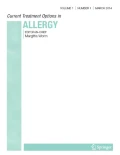Abstract
Purpose of Review
Aspirin-exacerbated respiratory disease (AERD), or NSAID-exacerbated respiratory disease (NERD), is a heterogeneous inflammatory syndrome characterized by Samter’s clinical triad of chronic rhinosinusitis with nasal polyposis (CRSwNP), asthma, and nonallergic hypersensitivity to all cyclooxygenase-1 (COX-1) inhibiting NSAIDs. This review focuses on randomized controlled trials and meta-analyses published on the clinical efficacy of aspirin therapy in AERD/NERD, as well as recent works published to explore the current outpatient ASA desensitization protocols in the US.
Recent Findings
Many AERD/NERD patients fail first-line therapies for treatment of asthma and CRSwNP and often need repeated sinus surgeries and frequent courses of oral corticosteroids to control symptoms. While COX-1 inhibiting NSAIDs are known to cause exacerbations in AERD/NERD, aspirin desensitization followed by maintenance oral high-dose aspirin therapy is proven to modulate the inflammatory cascade and has become a well-established treatment for most AERD/NERD patients. However, biologics are an emerging treatment option for pediatric patients and patients who are not candidates for aspirin desensitization.
Summary
Aspirin therapy after desensitization is beneficial for the majority of patients; however, the benefits, adverse effects, patient comorbidities, patient preferences, and all available treatment options must be considered in selecting an individualized treatment plan to address AERD/NERD.

No comments:
Post a Comment